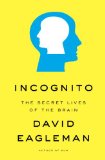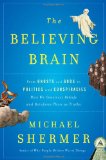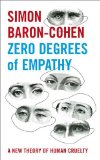May 31, 2011

Incognito: The Secret Lives of the Brain by David Eagleman (Pantheon, 2011)
(kindle ed.), (amazon.co.uk)
Product description from the publisher:
If the conscious mind—the part you consider to be you—is just the tip of the iceberg, what is the rest doing?
In this sparkling and provocative new book, the renowned neuroscientist David Eagleman navigates the depths of the subconscious brain to illuminate surprising mysteries: Why can your foot move halfway to the brake pedal before you become consciously aware of danger ahead? Why do you hear your name being mentioned in a conversation that you didn’t think you were listening to? What do Ulysses and the credit crunch have in common? Why did Thomas Edison electrocute an elephant in 1916? Why are people whose names begin with J more likely to marry other people whose names begin with J? Why is it so difficult to keep a secret? And how is it possible to get angry at yourself—who, exactly, is mad at whom?
Taking in brain damage, plane spotting, dating, drugs, beauty, infidelity, synesthesia, criminal law, artificial intelligence, and visual illusions, Incognito is a thrilling subsurface exploration of the mind and all its contradictions.
See also: Author’s website
Comments (0)
- cognitive science,new books
May 29, 2011

Thanks to 3quarksdaily for pointing me to this title via the Guardian interview with the author: The Enchanter: Nabokov and Happiness by Lila Azam Zanganeh (W.W. Norton & Co., 2011)
(kindle ed.), (amazon.co.uk)

Product description from the publisher:
Discovering happiness in reading the work of an extraordinary writer.
The protagonist of Vladimir Nabokov’s The Gift playfully dreamed of writing “A Practical Handbook: How to Be Happy.” Now, Nabokov’s own creative reader Lila Azam Zanganeh lends life to this vision with sly sophistication and ebullient charm, as she shares the delirious joy to be found in reading the masterpieces of “the great writer of happiness.”
Plunging into the enchanted and luminous worlds of Speak, Memory; Ada, or Ardor; and the infamous Lolita, Azam Zanganeh seeks out the Nabokovian experience of time, memory, sexual passion, nature, loss, love in all its forms, and language in all its allusions. She explores Nabokov’s geography-from his Russian childhood to the landscapes of “his” America-suffers encounters with his beloved “nature,” hallucinates an interview with the master, and seeks the “crunch of happiness” in his singular vocabulary. This beautifully illuminated book will both reignite the passion of experienced Nabokovians and lure the innocent reader to a well of delights as yet unseen. 12 black-and-white illustrations
See also: Author’s website
Comments (0)
- fiction,happiness,new books
May 24, 2011

The Believing Brain: From Ghosts and Gods to Politics and Conspiracies—How We Construct Beliefs and Reinforce Them as Truths by Michael Shermer (Times Books, 2011)
(kindle ed.), (amazon.co.uk)
Product description from the publisher:
Bestselling author Michael Shermer’s comprehensive and provocative theory on how beliefs are born, formed, reinforced, challenged, changed, and extinguished
In this work synthesizing thirty years of research, psychologist, historian of science, and the world’s best-known skeptic Michael Shermer upends the traditional thinking about how humans form beliefs about the world. Simply put, beliefs come first and explanations for beliefs follow. The brain, Shermer argues, is a belief engine. From sensory data flowing in through the senses, the brain naturally begins to look for and find patterns, and then infuses those patterns with meaning. Our brains connect the dots of our world into meaningful patterns that explain why things happen, and these patterns become beliefs. Once beliefs are formed the brain begins to look for and find confirmatory evidence in support of those beliefs, which accelerates the process of reinforcing them, and round and round the process goes in a positive-feedback loop of belief confirmation. Shermer outlines the numerous cognitive tools our brains engage to reinforce our beliefs as truths.
Interlaced with his theory of belief, Shermer provides countless real-world examples of how this process operates, from politics, economics, and religion to conspiracy theories, the supernatural, and the paranormal. Ultimately, he demonstrates why science is the best tool ever devised to determine whether or not a belief matches reality.
See also: Author’s website
Comments (0)
- cognitive science,new books,psychology
May 23, 2011

Landscape of the Mind: Human Evolution and the Archaeology of Thought by John F. Hoffecker (Columbia University Press, 2011)
(amazon.co.uk)
Product description from the publisher:
John F. Hoffecker explores the origin and growth of the mind, drawing on information from the human fossil record, archaeology, and history. Hoffecker argues that, as an indirect result of bipedal locomotion, early humans developed a feedback relationship among their hands, brains, and tools, evolving the capacity to externalize thoughts in the form of shaped stone objects. When anatomically modern humans evolved a parallel capacity to externalize thought as symbolic language, individual brains within social groups were integrated into a neocortical internet, or super-brain, thus giving birth to the mind. Noting that archaeological traces of symbolism coincide with evidence for the ability to generate novel technology, Hoffecker contends that human creativity, as well as higher-order consciousness, is a product of the collective super-brain. Hoffecker equates the subsequent growth of the mind with human history, which began in Africa more than 50,000 years ago. As anatomically modern humans spread across the globe, adapting to a variety of climates and habitats, they redesigned themselves technologically and developed alternative realities via toolmaking, tool use, and artistic expression. Hoffecker connects the rise of civilization to a hierarchical reorganization of the super-brain, triggered by explosive population growth. According to him, subsequent history reflects the varying degrees to which rigid hierarchies of states and empires suppressed the creative powers of the mind, constraining the further accumulation of knowledge. The modern world emerged from the fragments of a collapsed empire after 1200 AD. In the final chapter, Hoffecker speculates on the possibility of artificial intelligence and a mind without biology.
See also: “Evolution of human ‘super-brain’ tied to development of bipedalism, tool-making” at EurekAlert
Comments (0)
- consciousness,culture,human evolution,mind,new books
May 19, 2011

The Science of Evil: On Empathy and the Origins of Cruelty by Simon Baron-Cohen (Basic Books, 2001)
(kindle ed.)
(UK ed. – Zero Degrees of Empathy – at amazon.co.uk)

Product description from the publisher:
Borderline personality disorder, autism, narcissism, psychosis, Asperger’s: All of these syndromes have one thing in common–lack of empathy. In some cases, this absence can be dangerous, but in others it can simply mean a different way of seeing the world.
In Cruel or Unusual Simon Baron-Cohen, an award-winning British researcher who has investigated psychology and autism for decades, develops a new brain-based theory of human cruelty. A true psychologist, however, he examines social and environmental factors that can erode empathy, including neglect and abuse.
Based largely on Baron-Cohen’s own research, Cruel or Unusual will change the way we understand and treat human cruelty.
See also: Reuters article “Scientist seeks to banish evil, boost empathy,” Royal Institution lecture with audio archive
Comments (0)
- cognitive science,new books,psychology









